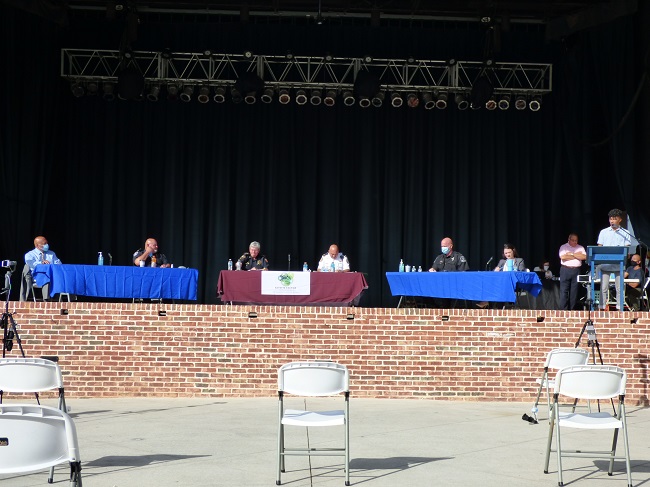
Panelists at the “Fayette Town Hall: Community Conversation on Policing and Race” held July 31 included, from left, attorney Wayne Kendall, Fayetteville Police Chief Scott Gray, Peachtree City Police Chief Janet Moon, Sheriff Barry Babb, Tyrone Police Chief Randy Mundy, District Attorney Marie Broder and facilitator Douglass Morris II. Photo/Ben Nelms.
Law enforcement officials and others from across Fayette County made up the panel July 31 at the “Fayette Town Hall: Community Conversation on Policing and Race” held July 31 at Southern Ground Amphitheater in Fayetteville
The event, which was attended in-person by approximately 100 people, was hosted by youth leaders and sponsored by Fayette FACTOR in cooperation with the City of Fayetteville.
Panelists included Fayette County Sheriff Barry Babb, Fayetteville Police Chief Scott Gray, Peachtree City Police Chief Janet Moon, Tyrone Police Chief Randy Mundy, civil rights attorney Wayne B. Kendall and District Attorney Marie Broder.
Texas A&M University student and Fayette resident Tori Davis initiated the event, which was facilitated by Davis and local students Douglass Morris II and Kaitlyn Hood.
Fayette FACTOR’s Dawn Oparah and Ogechi Oparah rounded out the event with closing comments.
Morris began the event, outlining why the conversation was needed.
“We are not here to bash law enforcement,” Morris said. “But this is a space to discuss how our law enforcement agencies and citizens can work together through respect and common goals that support inroads to the best community and best nation we can be. This is an opportunity to support a needed national conversation, based upon recent and highly-visible events of police brutality and excessive force around the country.”
The Fayette County “bubble” is not a shield against social problems, and it is not immune to social and racial injustice. Morris added.
Prior to questions for the panelists, and though new as District Attorney, Broder was asked to offer remarks about her years-long work with the District Attorney’s office.
“The questions to be asked tonight are important – what are we doing now, and what can we do better? I hope we are all hear to listen and understand what these agencies are doing in regards to race and policing,” Broder said.
Noting the tumultuous time being experienced in America, Broder said it was good to see the event take place.
“I work with the chiefs and sheriff on a weekly or monthly basis. I happy to say they run amazing organizations. Their departments are excellent as I hope you will hear tonight, and we in Fayette County are lucky to have them,” said Broder.
“My job as your District Attorney is to keep you, the citizens safe, to keep every person in this (judicial) circuit safe from those who seek harm,” Broder continued. “The conversations we will have tonight must happen. They are vital. And these law enforcement leaders work so very hard to keep you safe while fighting against injustice, as I do. As your District Attorney, I stand against injustice and seek justice for all.”
The conversation then moved to questions for the panelists, with a sampling of those questions and answers included below.
It should be noted that many of the well-prepared questions were complex, and would have required extensive time to be answered thoroughly. With the wealth of questions asked, the time allotted for the town hall did not permit thorough responses from each of the panelists on each of the questions.
One of the questions asked, what does anti-racism mean to you as a citizen and a leader of our community?
Mundy gave the first response saying, “For me anti-racism and policing means applying the law equally to everybody without regard to their race, and also to their gender and their religious beliefs. We do our best to do that.”
Up next, Babb said, “This is something that, to me, started with a good foundation, with a good set of parents who taught me to take care of everybody. I expanded on that. I wanted to take care of my community. I wanted to make a difference. We’re always working hard to strive for perfection. That’s tough in today’s world. So we’re hear to listen. I’m actually here to listen more than talk. I know each of the folks at this table, we’re embedded in this community and we’re here to listen.”
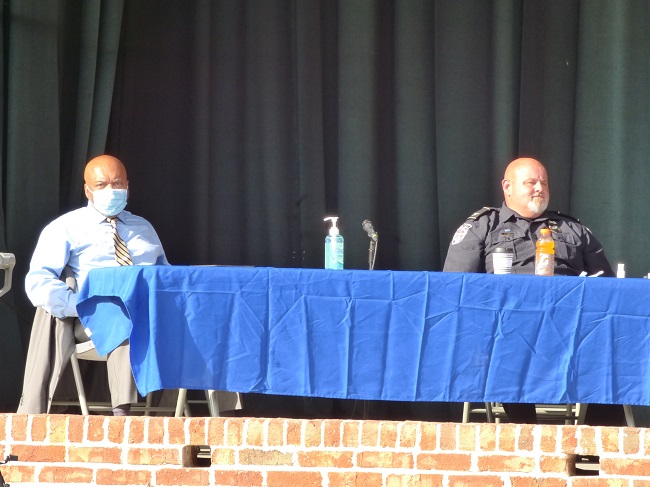
The next question went to Kendall, who was asked to recount some of the issues involving people of color and policing in Fayette County.
“I don’t think the problems here in Fayette are any different than the problems anywhere else. Policing is done by individuals. Individuals bring to policing their life’s experience. So whatever you have in the population in general, you have in the police force. So to the extent that you have persons who are insensitive to race or color or ethnicity, you’re going to have those people in the police force.
“So here in Fayette, I’ve had a few incidents I’ve thought were handled from a racially-insensitive standpoint. But I don’t fault the police here anymore than I would fault police generally. I recently had a case where a young man was arrested, and I think the care that should have been done to investigate his case was not done. I’m not going to indict the police departments here anymore than (in other cases elsewhere in Georgia),” Kendall said.
In another question, law enforcement officials were asked how they continue to promote anti-racist policy for their departments past what is written as part of the agency’s guidelines.
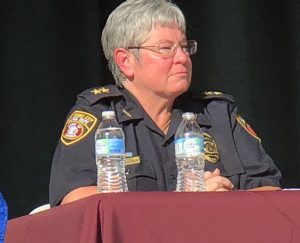
Moon responded, saying, “First of all, we know policies are a piece of paper. We can write the best policies in the world, but if we don’t train on them, if we don’t enforce them and if we don’t reinforce them then they are not as good as the paper they are written on. What we’re proud of in Peachtree City is that we’re dedicated that we want to look like our community and be diversified. And our demographics of our police department does match our community. We’re proud of that because it takes all of us together, as a whole working together, to solve the problems. Are we perfect? Absolutely not. Do we still have lots of room for improvement? Yes we do, or we wouldn’t be having conversations like we are here.
“I would say in Fayette County, we’re a little ahead of the curve. All of us have had numerous citizens come to our offices, send us emails and ask us questions. It’s been interesting that when we answer those questions, (we usually get the response that) ‘We didn’t know you did that. We didn’t know you collected that data. We didn’t know you were doing these things,'” Moon continued.
“We are collecting and doing things that a lot of the national movements are demanding they want police officers to do, and we’re happy to say we already do the majority of those. Are there areas we can still do better? Absolutely. And I want to echo what the sheriff said. Not only are we hearing you. Not only are we listening, but we’re listening to understand. And I think that’s the critical component. We’re listening to understand and make it better,” Moon said.
Another question asked the other panelists about the demographic make-up of their respective agencies and if hires are done with diversity on mind.
Gray answered first, saying the Fayetteville department has 62 employees. Of those, 45 are white, 14 are African-American, two are Hispanic and one is Asian.
“What I’m most proud of is that in our supervisory and leadership ranks, we are a very diverse organization. So we, too, match the demographics of our community,” Gray said. “We’re very proud of where we’ve come from. We’ve worked very hard to get us to this point. We don’t get many qualified applicants at the police department. So we have to weed them out, and there’s an extensive process that we go through where we (recently) had 45 applicants and it came down to one. One person.”
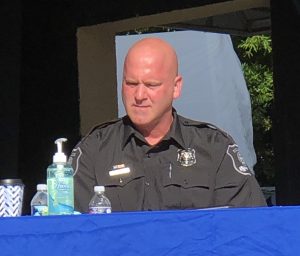
Mundy responded next, noting that Tyrone has 14 full-time officers. Until two weeks ago the department had two African-Americans, one male and one female. The male officer resigned and went to work in Clayton County.
“He told me he was kind of bored in Tyrone. We don’t get a lot of action. And I understand that. He has federal aspirations and he thought a larger agency would (benefit) his resume,” Mundy said. “Like Chief Gray said, it’s not easy to get a job in law enforcement. And it’s certainly not easy to recruit officers.”
Babb in his response said his office is made up of 150 sworn officers, plus detention officers at the jail. As of June, the sheriff’s office is a 33 percent minority agency. Comparing that to Fayette County’s total population make-up, the county in 2018 had 63 percent white residents, 22 percent black residents, Asian at 5 percent, Hispanic at 7 percent and multi-racial at 2 percent, Babb said.
“So at 33 percent minority (at the sheriff’s office), we’re really hitting the numbers. I didn’t realize we were in that good a shape,” Babb said, adding that the breakdown in the sheriff’s office is 28 percent black, 67 percent white and 5 percent Hispanic.
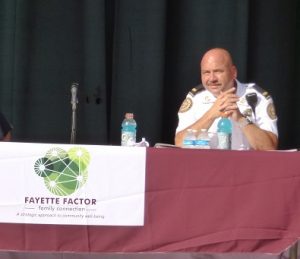
Another question asked how law enforcement agencies play a part in building connections with minorities.
“It starts with all of us,” Gray said, responding first. “Not only your local police department. Get involved in government. Come to commission and city council meetings. We invite people to our Citizen Police Academy and to do ride-alongs. Get involved in some of the services, like the fall festival (that includes multiple agencies). That shows that we’re all here and we’re all in it together. You have to get involved. There are a multitude of events in the county, including the cities.”
Gray noted the events at the amphitheaters in Fayetteville and Peachtree City where officers are present and interacting with citizens.
“But specifically, for law enforcement, it’s that community policing aspect. But call us, come see us,” he said. “When you see us at an event, come talk to us. We love that stuff. Don’t just stand on the sidelines and when something bad happens point fingers. We don’t want to do that. And I know nobody in the community wants to do that. So get involved with your local government, with civic organizations. Tell us what you see. We, and all the agencies, welcome the feedback. We want to see how we’re perceived. We’re trying to make it better. And what you honestly tell us, we try to develop and work on.”
Up next, Mundy said while law enforcement wants people to reach out and contact agencies, it’s also important “for all of us to reach out to you.”
Mundy said the agencies in the county conduct citizen police academies and coffee with a cop events.
“That’s where we meet you guys and get to know each other on a first-name basis, and hear your concerns and your ideas. That’s very important to us in Tyrone, and I think you’ll find that with the other agencies here as well,” said Mundy.
Though not noted in the responses, law enforcement agencies across the county also provide Christmas fundraisers for economically disadvantaged children, holding those fundraisers to buy Christmas gifts for those in need.
On still other occasions, individual officers initiate efforts, such as what happened in Peachtree City, where officers banded together to help a homeless family get a place to stay and secure provisions for the family and their new home.
Kendall also responded to the question about building connections with minorities.
“From my perspective as an attorney, I think that in Fayette County the area where I see the most disconnect between law enforcement and the community has been in the school system,” Kendall said. “Not so much recently, but a few years ago I was getting a lot of calls from parents whose kids were getting expelled from school. What I found was a little alarming, in that in that minorities made up roughly 25 percent of the student body at that time, maybe three or four years ago, and minorities were representing approximately 75 percent of all out-of-school expulsions. So that type of disparity was somewhat alarming because I don’t think that was by coincidence.”
Other questions during the town hall dealt with facets of communication and accountability with the public by law enforcement. It was noted that the agencies maintain a presence on social media and their websites.
Additionally, annual crime stats are collected, published and presented at city council and county commission meetings, on the respective websites and/or social media and are reported by local media.
The wealth of questions continued until the town hall concluded at 8 p.m.
It should be noted that, from this writer’s perspective, the students who put the event together and moderated it did an excellent job in framing and conducting the town hall, and managing to ensure that everyone had an opportunity to address the wealth questions that, realistically, would have easily taken many hours to accomplish.
The reader is encourage to view the town hall in its entirety on the Fayette FACTOR website at https://www.facebook.com/fayettefactor/videos/285763559369731





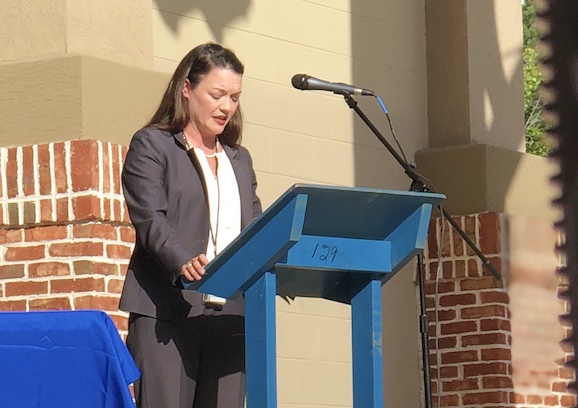







Leave a Comment
You must be logged in to post a comment.